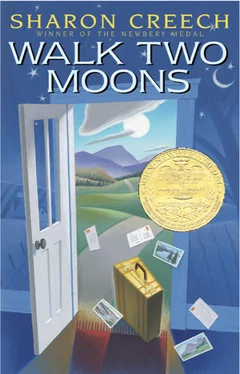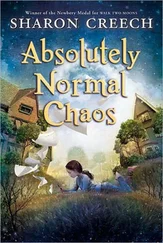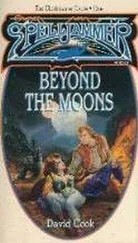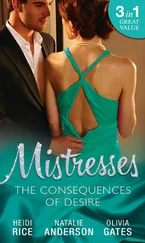“Oh no,” Phoebe said. The man with the bushy black hair was Mr. Birkway, our English teacher.
Mrs. Cadaver pointed to the rhododendron bush and then at the axe, but Mr. Birkway shook his head. He disappeared into the garage and returned with two shovels. Then he and Mrs. Cadaver gouged and prodded and tunneled around in the dirt until the poor old rhododendron flopped onto its side. They lugged the bush to the opposite side of the yard where there was a mound of dirt, and they replanted the bush.
“Maybe there’s something hidden under the bush,” Phoebe said.
“Like what?”
“Like Mr. Cadaver—as I told you before. Maybe Mr. Birkway helped her chop up her husband and bury him and maybe they were getting worried and decided to disguise the spot with a rhododendron bush.” I must have looked skeptical. Phoebe said, “Sal, you never can tell. And Sal, I don’t think you or your father should go over there anymore.”
I certainly agreed with her on that one. Dad and I had been there two nights earlier, and I had hardly been able to sit still. I started noticing all these frightening things in Margaret’s house: creepy masks, old swords, books with titles like The Murders in the Rue Morgue and The Skull and the Hatchet. Margaret cornered me in the kitchen and said, “So what has your father told you about me?”
“Nothing,” I said.
“Oh.” She seemed disappointed.
My father’s behavior was always different at Margaret’s. At home, I would sometimes find him sitting on his bed staring at the floor, or reading through old letters, or gazing at the photo album. He looked sad and lonely. But at Margaret’s, he would smile, and sometimes even laugh, and once she touched his hand, and he let her hand rest there on top of his. I didn’t like it. I didn’t want my father to be sad, but at least when he was sad, I knew he was remembering my mother. So when Phoebe suggested that my father and I should not go to Margaret’s, I was quite willing to agree with that notion.
When Phoebe’s mother came home from running all her errands, she looked terrible. She was sniffling and blowing her nose.
Phoebe said that we were going to do our homework. Upstairs, I said, “Maybe we should have helped her put away the groceries.”
“She likes to do all that by herself,” Phoebe said.
“Are you sure?”
“Of course I’m sure,” Phoebe said. “I’ve lived here my whole life, haven’t I?”
“She looked as if she’d been crying. Maybe something is wrong. Maybe something is bothering her.”
“Don’t you think she would say so then?”
“Maybe she’s afraid to,” I said. I wondered why it was so easy for me to see that Phoebe’s mother was worried and miserable, but Phoebe couldn’t see it—or if she could, she was ignoring it. Maybe she didn’t want to notice. Maybe it was too frightening a thing. I wondered if this was how it had been with my mother. Were there things I didn’t notice?
Later that afternoon, when Phoebe and I went downstairs, Mrs. Winterbottom was talking with Prudence. “Do you think I lead a tiny life?” she asked.
“How do you mean?” Prudence said, as she filed her nails. “Do we have any nail polish remover?”
Phoebe’s mother retrieved a bottle of nail polish remover from the bathroom.
“Oh!” Prudence said. “Before I forget—do you think you could sew up the hem on my brown skirt so I could wear it tomorrow? Oh, please?” Prudence tilted her head to the side, tugged at her hair in exactly the same way Phoebe does, and smooshed up her mouth into a little pout.
“Doesn’t Prudence know how to sew?” I asked.
“Of course she does,” Phoebe said. “Why?”
“I was just wondering why she doesn’t sew her own skirt.”
“Sal, you’re becoming very critical.”
Before I left Phoebe’s that day, Mrs. Winterbottom handed Prudence her brown skirt with the newly sewn hem, and all the way home I wondered about Mrs. Winterbottom and what she meant about living a tiny life. If she didn’t like all that baking and cleaning and jumping up to get bottles of nail polish remover and sewing hems, why did she do it? Why didn’t she tell them to do some of these things themselves? Maybe she was afraid there would be nothing left for her to do. There would be no need for her and she would become invisible and no one would notice.
When I got home that day, my father handed me a package. “It’s from Margaret,” he said.
“What is it?”
“I don’t know. Why don’t you open it?”
Inside was a blue sweater. I put it back in the box and went upstairs. My father followed me. “Sal—? Sal—do you like it?”
“I don’t want it,” I said.
“She was just trying to—she likes you—”
“I don’t care if she likes me or not,” I said.
My father stood there looking around the room. “I want to tell you something about Margaret,” he said.
“Well, I don’t want to hear it.” I was feeling so completely ornery. When my father left the room, I could still hear my own voice saying, “I don’t want to hear it.” I sounded exactly like Phoebe.
It was hotter than blazes in South Dakota. In Sioux Falls, Gramps took off his shirt. Passing Mitchell, Gram unbuttoned her dress down to her waist. Just beyond Chamberlain, Gramps took a detour to the Missouri River. He parked the car beneath a tree overlooking a sandy bank.
Gram and Gramps kicked off their shoes. It was quiet and hot, hot, hot. All you could hear was a crow calling somewhere up river and the distant sound of cars along the highway. The hot air pressed against my face, and my hair was like a hot, heavy blanket draped on my neck and back. It was so hot you could smell the heat baking the stones and dirt along the bank.
Gram pulled her dress up over her head, and Gramps undid his buckle and let his pants slide to the ground. They started kicking water at each other and scooping it up and letting it run down their faces. They walked in to where it was knee deep and sat down.
“Come on, chickabiddy,” Gramps called.
Gram said, “It’s delicious!”
I gazed up and down the river. Not a soul in sight. The water looked cool and clear. Gram and Gramps sat there in the river, grinning away. I waded in and sat down. It was nearly heaven, with that cool water rippling and a high, clear sky all around us, and trees waving along the banks.
My hair floated all around me. My mother’s hair had been long and black, like mine, but a week before she left, she cut it. My father said to me, “Don’t cut yours, Sal. Please don’t cut yours.”
My mother said, “I knew you wouldn’t like it if I cut mine.”
My father said, “I didn’t say anything about yours.”
“But I know what you’re thinking,” she said.
“I loved your hair, Sugar,” he said.
I saved her hair. I swept it up from the kitchen floor and wrapped it in a plastic bag and hid it beneath the floorboards of my room. It was still there, along with the postcards she sent.
As Gram, Gramps, and I sat in the Missouri River, I tried not to think of the postcards. I tried to concentrate on the high sky and the cool water. It would have been perfect except for that ornery crow calling away: car-car-car. “Will we be here long?” I asked.
The boy came out of nowhere. Gramps saw him first and whispered, “Get behind me, chickabiddy. You too,” he said to Gram. The boy was about fifteen or sixteen, with shaggy dark hair. He wore blue jeans and no shirt, and his chest was brown and muscular. In his hand he held a long bowie knife, its sheath fastened to his belt. He stood next to Gramps’s pants on the bank.
Читать дальше












